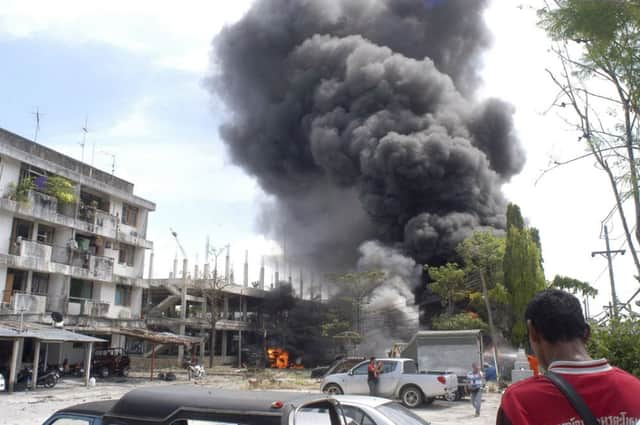Thai prime minister faces court bid to oust her


The Constitutional Court is expected to issue a ruling today that could remove her from office, raising the possibility that the Thai legal system could accomplish what protesters have been trying to do for six months through street demonstrations. and mounting violence.
More than 20 people have been killed since November. Yesterday nine people were hurt when a bomb exploded near a police station in Hat Yai city, in southern Songkhla province.
Advertisement
Hide AdAdvertisement
Hide AdMs Shinawatra defended herself yesterday against the abuse of power allegations in a key case that is one of several legal challenges that could force her from her job.
She is accused of abusing her authority by transferring her National Security Council chief in 2011 to another position. A group of anti-government senators, who lodged the case, said the transfer was to benefit her ruling party and violated the constitution.
“I would like to deny all allegations I am accused of,” she said calmly, seated beside her legal team. “As the prime minister, I am entitled to carry out responsibilities I have toward the people … and for the utmost benefit of the general public.”
Judge Charoon Intachan said after her testimony that the court would rule today. Members of her cabinet who were in office at the time of the transfer could also be found liable.
The prime minister’s testimony at the Constitutional Court marked the latest twist in Thailand’s ongoing political crisis.
Supporters accuse the courts of trying to topple Ms Shinawatra through abuse of the legal system after six months of anti-government protests failed to unseat her. Her supporters say the courts are biased against her.
In February, another court ruled that the official, Thawil Pliensri, must be restored to his job. That ruling by the Administrative Court found that while it was within Ms Shinawatra’s right to reshuffle civil servants, she had failed to address the reasons for the transfer. If she is found guilty of interfering in state affairs for her personal benefit or that of her party, she would have to step down.
Thailand has been gripped by political conflict since 2006, when then-prime minister Thaksin Shinawatra, Yingluck’s billionaire brother, was ousted in a military coup after being accused of corruption and abuse of power. His supporters and opponents have each taken to the streets for extended periods in a power struggle that is now focused on removing his sister, who took office in 2011.
Advertisement
Hide AdAdvertisement
Hide AdOpponents say she is a proxy for her brother, who is living overseas in self-imposed exile.
Currently, Ms Shinawatra is a caretaker prime minister, having called early elections in February as a way of affirming her mandate after the protests against her began. However, the 2 February elections were subsequently annulled by the Constitutional Court and new polls have been scheduled for July.
The leader of the opposition Democrat Party, Abhisit Vejjajiva, a former prime minister, recently called for Ms Shinawatra and her cabinet to resign and make way for an interim administration which would work on reforming the constitution.
He said their proposals could then be put to a referendum, with elections six months later.
“Yingluck should make the sacrifice of withdrawing from power,” he said. “No side can gain 100 per cent from my plan … but every side will have their demands addressed.”